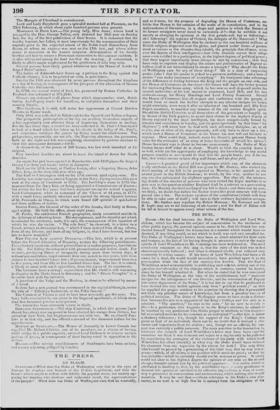AN ALARM.
THE PRESS.
STANDARD—What does the Duke of Wellington care that in the eyes of Europe he displays one branch of the British Legislature, and that the braucil which ought to reflect with fidelity the popular sense, not merely op- posing but treating with studious and reiterated insult, the representations of the people? What does the Duke of Wellington care that he wantonly,
and as it were, for the purpose of degrading the House of Commons, ex- hibits that House to the enemies of the made of its constitution, and to the malecontents of the-nation, in a shape and position in which the fiercest of its former arraigners never dared to caricature .it ?—that he exhibits it not
merely as changing its opinions at the .first .;parade-roll, but as following--
oh ! following! the rejected of Oxford, the delegate of Sir Manasseh ? What cares the Duke of Wellington that be declares to the one hrindred millions of British subjects dispersed over the globe, and placed under forms of govern-
ment as various a.s the climates they inhabit, the principle that all men, what- ever the degree of their intelligence—how little absolute snever their allegi- ance—are entitled to a participation, in the highest degree, of political power; that their urgent importunity must always be met by concession ; that they have only to organize and display the means and preliminaries of flagrant re- bellion (call it not intimidation) to ensure a triumph? Why should the Duke of Wellington care for any of these things? He is a man of surpassing genius (alas ! that his genius is yoked to a perverse ambition); and a man of genius " can make increment of everything." Do foreigners take advantage of the ditference of feeling between the King and the people on one side, and the House of Commons on the other—his Grace will have the better pretext for increasing that home army, which he has now so well disposed under the several authorities of his late second in command, Lord Hill, and his late aides-die-camp, Sir Henry Harding° and Lord Fitzroy Somerset. Should the House of Commons lose all respect and confidence with the people, it would ferns so much the feebler obstacle to any ulterior designs his Grace might entertain, even were it after an infusion of one hundred and fifty Irish Papist members, to manifest any remains of the old restive English spirit. Should the British Colonists avail themselves of the:precedent so happily set in favour of the Irish papists, to assert their claims to the highest degree of liberty enjoyed by the most intelligent, the most unequivocally bound by interest and conscience to loyalty, and Ids grace (probably by that time " his Highness") will know how to deal with such refractory disciples, or, at all events, one or other of his major-generals, will only have to draw up a law , which suet, a House of Commons as his Grace has now will not hesitate to register. How could they, indeed, slimed his Grace's present House freely votes for the estimates of an army at home live-sixths of which his Grace's Home Secretary says is about to become unnecessary. The Duke of Wel- lington knows well what he is about. Would to God the country knew it Li well, while yet the opportunity of employing the knowledge to any useful purpose remains to us—would to God that the people knew, ere it be too late, that which sooner ()slater they will know, and we fear feel.
GLOSE—A practical proof of the importance which one of the alarmists really attributes to the Relief Bill was given by Mr. Bankes, who wished the third reading of the bill to be postponed on Monday, to his speech on the annual grant to the British Museum; to which, by the way, neither he nor any one else anticipated the slightest opposition. But after all, the interest- ing, details ()I' the number of persons who have visited the Elgin marbles is to give way to the question whether England shall he a tolerant or a persecuting state. On Monday the third reading of the bill is fixed ; and there can be now, we think, no doubt that before the Easter recess this great measure will have passed into a law. The zealous curators of the constitution (Which will then be able to take care of itself) will turn to their ordinary legislative occupa- tions. Mr. Bankes may regulate the British Museum; Mr. Estcourt and Sir R. Inglis may see to the licensing of ale-houses ; and -the Earl of Eldon will be left at leisure to oppose every other reform of the law.


















 Previous page
Previous page